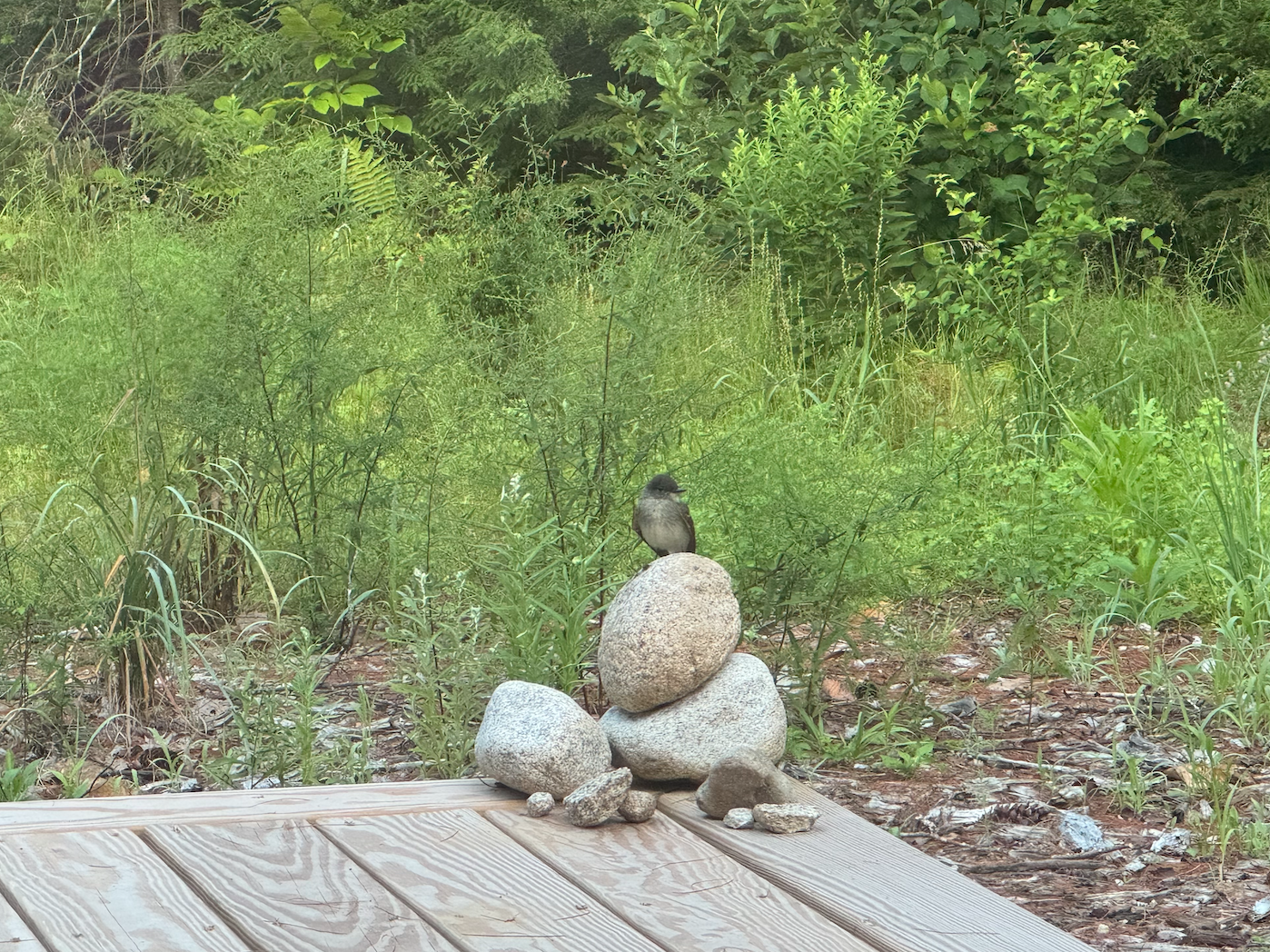
Last summer, I took this photo of one of my most relaxing places. Being on that deck in Maine, I can recharge my battery. I like to think that the bird in the photo saw that pile of rocks and thought, "If I sit there for a while, I'll have more energy to fly higher with my feathers freer and attitude better," or whatever the avian equivalent of taking a break would be.
Now, I'm coming to the end of another busy term at school. While students are on campus, it would be easy for me to be engaged in a work-related activity every hour of every day. Sometimes, I think that's how I should do my job -- attend every game, concert, show, meet, match, race. During the day when I'm not teaching my own courses, I could sit in on others' classes to get a better sense of how my students interact in other settings. And I do as much showing up as I can.
But I also try to remember that (1) it's physically impossible be at everything, (2) my students need to learn to do what they do for intrinsic rather than extrinsic rewards, and (3) I can't be the best me unless I have the energy and enthusiasm that comes from strategic down time.
I like the metaphoric language people use to explain the importance of rest:
- recharge my battery
- refill my tank
- reset my motherboard (Did I make that one up?)
There are certainly more, but I'm blanking right now -- probably because I'm running on empty. I know that if I rest and relax, ideas will come to me, energy will return to my body and brain, and I'll be ready to see the world with an open mind and heart and face new challenges with enthusiasm and ingenuity.
How do you reset your body and mind? What benefits do you notice when you give yourself room to breathe? How do you know when you've had the necessary rest before time off becomes wasted time? Please share any responses in the comments.
I can’t answer your questions because I’ve been working all day every day. Maybe I should try to change that, but it’s hard when you’re freelance because too much, while stressful, is still much easier to handle than not enough.
I hear you. I’ve never worked freelance, so I can’t know how one would balance one’s time with that kind of employment. Sounds stressful!
I took a theater management class this past semester and we spent a lot of time talking about exhaustion and burn out (specifically within theatrical contexts but I think it applies more broadly too). We learned about the differences between mental, emotional, and physical exhaustion and how to identify which one you are feeling at any given moment. A big emphasis in this class was not just recharging, but learning how to efficiently recharge (because in theater, as in many places time is money and thus all time must be optimized to a T). Before this class I was never one to really take breaks. I would just get in the zone and work until I was done (or until I fell asleep). However, after taking this class I now have the skills to identify when I’m starting to lose my energy and also the skills to quickly and effectively recharge. So when I feel myself slipping I set a timer for however long a break I feel I need (usually around 5-10 minutes) and recharge in whatever way is best for the type of exhaustion I’m feeling, whether that be going for a walk, listening to music, taking a quick Power Nap, or something else entirely. This small change to the way I approach work has been surprisingly effective. I’m honestly shocked at how much time taking breaks has saved me.
(Also yes, the irony of replying to this post about recharging at 1am instead of going to sleep is not lost on me.)
Hi Aster. This class sounds like one EVERYONE should take! What a gift to learn how to read one’s own body and give it exactly what it needs to work at its best. Is the teacher published? Were there good reading assignments you’d recommend? I’d love to share some of its teachings with the 2025s and/or the other students/teachers here. Also, yes, time to go to sleep (unless, of course, reading my Why Wednesday was your way of recharging). Happy Holidays to you and your fam!
My neighbor, my senior by about 20 years, once imparted some wisdom to me that really stuck. He said when you’re young, you think your energy is limitless. As you grow older, you realize that energy is finite and you need to manage it and allocate it wisely from day to day, hour to hour. As I increase the number of birthdays under my belt, I see the truth in his words. That means establishing my energy priorities each day/week and making decisions about how to preserve and use it. If I want to do a 5-mile hike, I can’t also rake my leaves in the same day. If I want to spend 3 hours on a deep focus pursuit, then I need to do something requiring less-focused movement, like ironing, at some point after that. I’m getting better at knowing my energy capacity for a given period and allocating myself accordingly. Not perfect, but better.
Hmmm. I’m not sure how I feel about this advice. I get that I have less energy for some things than I used to have, but I also have found activities that fill my energy cup back up. When I don’t exercise, for example, I get lethargic. I appreciate the need for balancing high-energy-demanding activities with low-energy-demanding activities, but I also like the idea of finding the pursuits that, no matter how hard, give me more energy. What do you think?